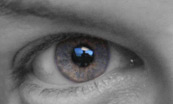My first-born daughter's love language is physical affection. I wonder why life has given her a mother who doesn't like to be touched. I so desperately want to give her the love she needs, and she needs it, oh so desperately. She requests constant confirmation that I haven't changed my mind over how I feel about her. I don't know why. What have I done that this kid does not believe her mother's love is a permanent condition? I thought, I am a pretty conscientious parent -- I have always made an effort to talk about our feelings, good and bad. But, I guess, all my kid wants is to be held every day and even though I would die for my children, giving out hugs is a task requiring great effort where there should be none. My hugs feel mechanical and my daughter comments with amusement over my somatic shortcomings. Nonetheless, she reaches out to be touched every day.
"What's that?" I inquired.
"This is Mommy - angry in the morning," she explained like it's the most natural thing in the world.
As my kids have grown older, I've become even more relaxed. Too relaxed for someone who doesn't allow cursing in the house. I have developed, like my father when I was a teenager, the double-standard that I, as the parent, am allowed to use crude language when needed, but for the children to use a foul word would be a down-right abomination. Never mind the fact that, from hearsay, I know that my 18-yr-old curses like a sailor when she is with her friends.
The other day, I yelled at Lee to wash her effin' hands and to eat her effin' french toast already (and, no effin-s but the actual F word were used). Granted, it was before 9 a.m., but who does that?! For all the self-control I can exercise throughout the day - some call me the queen of diplomacy (okay, nobody does, but I'd like to think I am) - in the morning hours, I am pure animal instincts. When the kids were younger, there were times I would simply just growl at them. Like a mother bear, but not in the affectionate way one might imagine this now.
When Lee later reminded me of my schizophrenic behavior in the morning and recommended to perhaps avoid interaction with other people before noon, I went into a bit of guilt-driven introspection. What I emerged with was that, while I may in fact be a different person in the morning who is best left alone to adjust to the waking life, the expletives targeted at my kid earlier in the day were ultimately driven by worry and love. I love my child and she is systematically starving herself into a body that more resembles a victim of famine than an average, athletic American teen from a loving, somewhat middle-class home.
When I presented my theory to her, she rolled her eyes.
"I think my love language takes the form of expletives," I said.
"Your love language is acts of service, Mom", Lee responded without looking up from her phone.
Okay - so much for today's attempt at self-analysis.
Maybe my daughter does know how much I love her.

